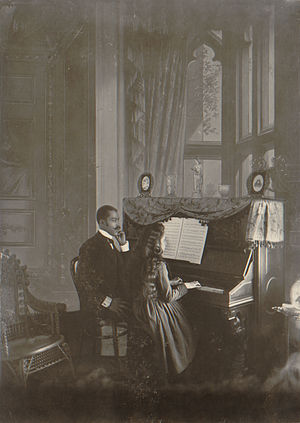African-American culture, also known as black culture, in the United States refers to the cultural contributions of African Americans to the culture of the United States, either as part of or distinct from American culture. The distinct identity of African-American culture is rooted in the historical experience of the African-American people, including the Middle Passage. The culture is both distinct and enormously influential to American culture as a whole.African-American culture is rooted in Africa. It is a blend of chiefly sub-Saharan African and Sahelean cultures. Although slavery greatly restricted the ability of Americans of African descent to practice their cultural traditions, many practices, values, and beliefs survived and over time have modified or blended with white culture and other cultures such as that of Native Americans. There are some facets of African-American culture that were accentuated by the slavery period. The result is a unique and dynamic culture that has had and continues to have a profound impact on mainstream American culture, as well as the culture of the broader world.Elaborate rituals and ceremonies were a significant part of African Culture. West Africans believed that spirits dwelled in their surrounding nature. From this disposition, they treated their surroundings with mindful care. Africans also believed spiritual life source existed after death. They believed that ancestors in this spiritual realm could then mediate between the supreme creator and the living. Honor and prayer was displayed to these " ancient ones", the spirit of those past. West Africans also believed in spiritual possession.In the beginning of the eighteenth century Islam began to spread across North Africa; this shift in religion began displacing traditional African spiritual practices. The enslaved Africans brought this complex religious dynamic within their culture to America. This fusion of traditional African beliefs with Christianity provided a common place for those practicing religion in Africa and America.After emancipation, unique African-American traditions continued to flourish, as distinctive traditions or radical innovations in music, art, literature, religion, cuisine, and other fields. 20th-century sociologists, such as Gunnar Myrdal, believed that African Americans had lost most cultural ties with Africa. But, anthropological field research by Melville Herskovits and others demonstrated that there has been a continuum of African traditions among Africans of the Diaspora. The greatest influence of African cultural practices on European culture is found below the Mason-Dixon line in the American South.For many years African-American culture developed separately from European-American culture, both because of slavery and the persistence of racial discrimination in America, as well as African-American slave descendants' desire to create and maintain their own traditions. Today, African-American culture has become a significant part of American culture and yet, at the same time, remains a distinct cultural body.




Comentar
0